Remembering Bill Livingstone
Bill Livingstone’s passing on February 22, 2025, a month short of what would have been his eighty-third birthday, was met with profound sadness throughout the piping and drumming world.
A master of piobaireachd, light music, and pipe bands, he was the first true “all-around” piper. He achieved the most significant awards available in each domain. Perhaps more importantly, he had the courage, creativity, and leadership skills to push the boundaries of pipe band music.
![A typical sight: Bill and Lily embracing one another, a love that continued with intensity for more than 60 years. [Photo Doug MacRae]](https://www.pipesdrums.com/storage/2025/02/Livingstone_Bill_Lillian_2003.jpg)
When he first travelled to Scotland to compete in solo competitions, Bill attended the Aboyne Highland Games. He encountered the legendary Bob Nicol as a judge of the Piobaireachd. He played his tune and got nothing. He later confronted Nicol—something rarely done then and unheard of by a young overseas piper. “What was wrong with my tune?” Bill asked. Nicol reportedly said, “The taorluath movement. Every one was a mistake.” Bill’s response: “Well, fry my ass!”
Nicol was utterly befuddled.
The episode is the stuff of legend with older pipers. One who was there described it as “An iconic moment: classic encounter between the conservative Scottish establishment and the youthful enfants terribles from North America. You could almost hear the tectonic plates moving.”
Bill Livingstone made himself present wherever he was. Many, like Nicol, didn’t know what to make of him. But those who got to know him would understand him as gentle, sensitive and loving, with massive intellect and erudite oratory to match. Outspoken, irreverent, worldly, and always well-informed, he voraciously consumed life and all its absurdities.
We could have asked many more who knew him well to contribute their thoughts—and we still welcome them via our Comments section. We approached several pipers and drummers to share their thoughts and memories about this man of firsts.
George Campbell
With a deep sense of personal loss, I mourn the passing of Bill Livingstone: a world-renowned piping luminary, player, composer, and gifted musician. My sincere condolences to Lillian and the Livingstone family.
I first met Bill in the fall of 1970, when he and Lillian came to a meeting of the Toronto Branch of the Pipers & Pipe Band Society of Ontario, of which I was president. Bill had recently graduated from law school and was in the process of setting up a practice in Oshawa. This was fortuitous, as I was the pipe-major of a newly formed band and was in negotiations with the custodians of the defunct General Motors Pipe Band in Oshawa. Realistically, the band existed in name only, with the custodians fulfilling playing duties at GM functions to maintain a grant from the GM recreation department.
I invited Bill to join us and embark on this new adventure, which he did, and that is when our journey began.
He single-handedly brought honour and accolades not only to himself but to Ontario and Canadian piping.
From the outset, it was apparent that there was something special about Bill. He was bound for a great future in piping. Though he was already an accomplished light music player, he had recently started taking piobaireachd lessons from the great John Wilson. Even at that early stage, it was apparent that he had found his calling: he consumed it, and it consumed him. His work ethic and practice regimen were remarkable, both in hours spent and intensity. All that, coupled with his innate sense of musicality and attention to John Wilson’s instruction, soon found him at the top of domestic prize lists. Not content with that success, he ventured to Scotland to compete against the best and make his presence felt. He single-handedly brought honour and accolades not only to himself but to Ontario and Canadian piping.
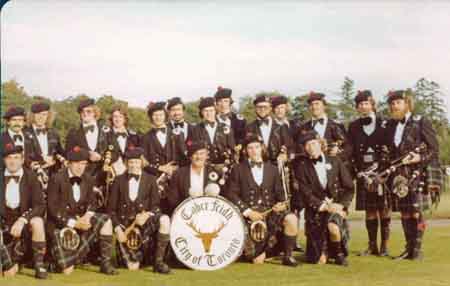
As if that was not enough, Bill still found time to be the sergeant piper of a prize-winning Grade 2 band. During this time, Bill and I discussed and put into practice many ideas, such as playing Highland reels and jigs in a round style, which was considered novel at the time. We also implemented setting chanters to a higher pitch and having a “clear high-A” as opposed to a thicker, flatter high-A that was common at the time.
Having such a flamboyant, charismatic player in the band was not always easy. Bill could certainly be controversial; even in these early days, he was often at loggerheads with the elected officials of the PPBSO, whether it was promoting piobaireachd competitions at all outdoor games in Ontario, fighting for better prize money, or raising the tune requirements for open competitors to match Scottish required tune submissions.
All that because Bill was seen playing in a Professional contest in the morning of a games without any sort of prescribed hat. To me, it seemed like taking an elephant gun to kill a mosquito. That is the kind of emotion Bill could engender.
Of course, who can forget the controversy of the balmorals (or lack thereof), which resulted in a three games suspension for the GM band and all its solo players who were championing every grade from Open down to Grade 3 Amateur. All that because Bill was seen playing in a Professional contest in the morning of a games without any sort of prescribed hat. To me, it seemed like taking an elephant gun to kill a mosquito. That is the kind of emotion Bill could engender.
The band was elevated to Grade 1 in 1973 after winning two North American Championships at Maxville in 1971 and 1972, though we lost the drum corps at the end of the 1972 season and could not compete. We did, however, return to Grade 1 in 1974. I continued as pipe-major until returning from a trip to Scotland in 1978. Incidentally, Bill guested with the band at the Cowal Games in 1978. That’s when the seed was planted that Bill would become the new leader of the GM Pipe Band, which would later become the 78th Fraser Highlanders, and the rest, as they say, is history.
Bill’s contribution and impact on the global piping and pipe band scene are invaluable, and his presence will be sorely missed.
Now retired from piping, Scotland-born George Campbell was the pipe-major of some of the most influential bands to emerge from Ontario, which helped to inform Bill Livingstone’s skills and perspective on pipe band music.
Bruce Gandy
I met Bill Livingstone in April 1982. Although I had seen him play live at a piping school back in 1973, I never actually met him then, but in 1982 he was judging the Vancouver Indoor Gathering.
He was very complimentary and kind about my playing, which turned out to be a good thing because, by October of that same year, after meeting my future wife Beverley, I had decided to move to Ontario. When I arrived, the entire band was incredibly welcoming, which meant the world to me as a 19-year-old.
![Bill Livingstone takes a reading from Bruce Gandy's chanter at Chatham Highland Games, Chatham, Ontario, 1991. [Photo pipes|drums]](https://www.pipesdrums.com/storage/2025/02/Gandy_Bruce_Livingstone_Chatham1991.jpg)
We put him through hell. Looking back, I genuinely feel bad about the grief we gave him, just being cheeky young players in our early twenties. He had to put up with everything, yet he handled it with remarkable patience. Through it all, he taught me so much, not just about piping, but about leadership, discipline, and resilience.
Beyond music, both Bill and his wife, Lillian, became parental figures to Beverley and me. They were always there with advice about anything in life. Beverley, who worked in the legal field, often sought Bill’s perspective. They both had this wonderful way of making you feel welcome while setting a high standard.
Beverley and I quickly learned the difference between casual get-togethers and a true dinner party. If I was at their house for visit, a lesson or leaving for band practice on a Tuesday or Thursday, I’d just walk in, say hello, and have a drink. But if we were invited for a dinner party on a Friday or Saturday, it was different. We’d arrive at the door, knock, and be appropriately greeted with handshakes, hugs, and a moment of formal elegance with a cocktail always to start that made the evening feel special. Their dinners were fantastic, and those nights always felt like an occasion.
I took some lessons from Bill when I could at the beginning, but it wasn’t on a strict schedule. However, after moving to Oshawa in 1990, I became more serious about studying with him. I was at their house often as they lived so close to us. I’d show up around 7 pm, and they’d usually be just finishing dinner. So, I’d warm up in the other room, and then be playing and talking through the tunes for two or three hours or more.
Afterward, Bill would say, “Go grab a beer from the garage,” and then he’d play. He wanted me to listen to his tunes and read through the scores—often the pieces he was preparing for Oban or Inverness.
Those nights were intense, and I vividly remember the drives home, just buzzing with everything I had learned. I had to pull over at the end of my street more than once because I needed a few minutes to process it all. The experience of playing, discussing, and absorbing so much knowledge was overwhelming in the best way possible.
Watching Bill prepare and perform a piobaireachd was a masterclass in itself. His focus and determination were second to none.
Beyond piping, Bill and Lily were also incredibly supportive of me in my work as a carpenter. They recommended me to friends, and I did a lot of work on their house—renovating the barn, upgrading trim, replacing doors—whatever they needed. That support meant a lot. Watching Bill prepare and perform a piobaireachd was a masterclass in itself. His focus and determination were second to none. I’ll never forget seeing him win the Piobaireachd at the Glenfiddich.
At 60 years old, his playing kept getting better and better. As soon as he started the tune, I knew it would be something special.
I’ll miss him dearly. We didn’t get as many visits in recent years as I would have liked, but Beverley and I had a wonderful dinner with Bill and Lily in Whitby last year. It was like no time had passed. We caught up on everything as if we hadn’t lived away for 20-plus years. Bill was always available to listen to my recorded tunes if I called and set up a time, and at times, if he was not at the gym, chat about music, work, or life in general.
He was a mentor, a guide, and a true friend. I could go on all night about what he meant to me, but I’ll leave it here. Selfishly, I miss him, but I take comfort in knowing he is at peace now. I hope he rests well.
Bruce Gandy is one of the world’s greatest pipers. He was a member of the 78th Fraser Highlanders under Bill Livingstone for more than a decade, many of them as pipe-sergeant.
Jenny Hazzard
The idea that Bill Livingstone is not around anymore is tough to accept and probably always will be.
For a kid involved in piping and pipe bands in Canada, growing up in the 1980s, Bill was a rock star. He was the top of the tree, the player we all admired and idolized. The78th Frasers were breaking boundaries, playing incredible music, and of course winning the World Championships. The impact that band and its music had on pipers of my generation in Canada (and around the world, I know) really can’t be overstated. Plus, he was this masterful solo piper; a winning machine at the games in Ontario, and achieving such impressive success in Scotland. I think as youngsters we all wanted to just be in his orbit, listen to him play, and cheer on that incredible band.
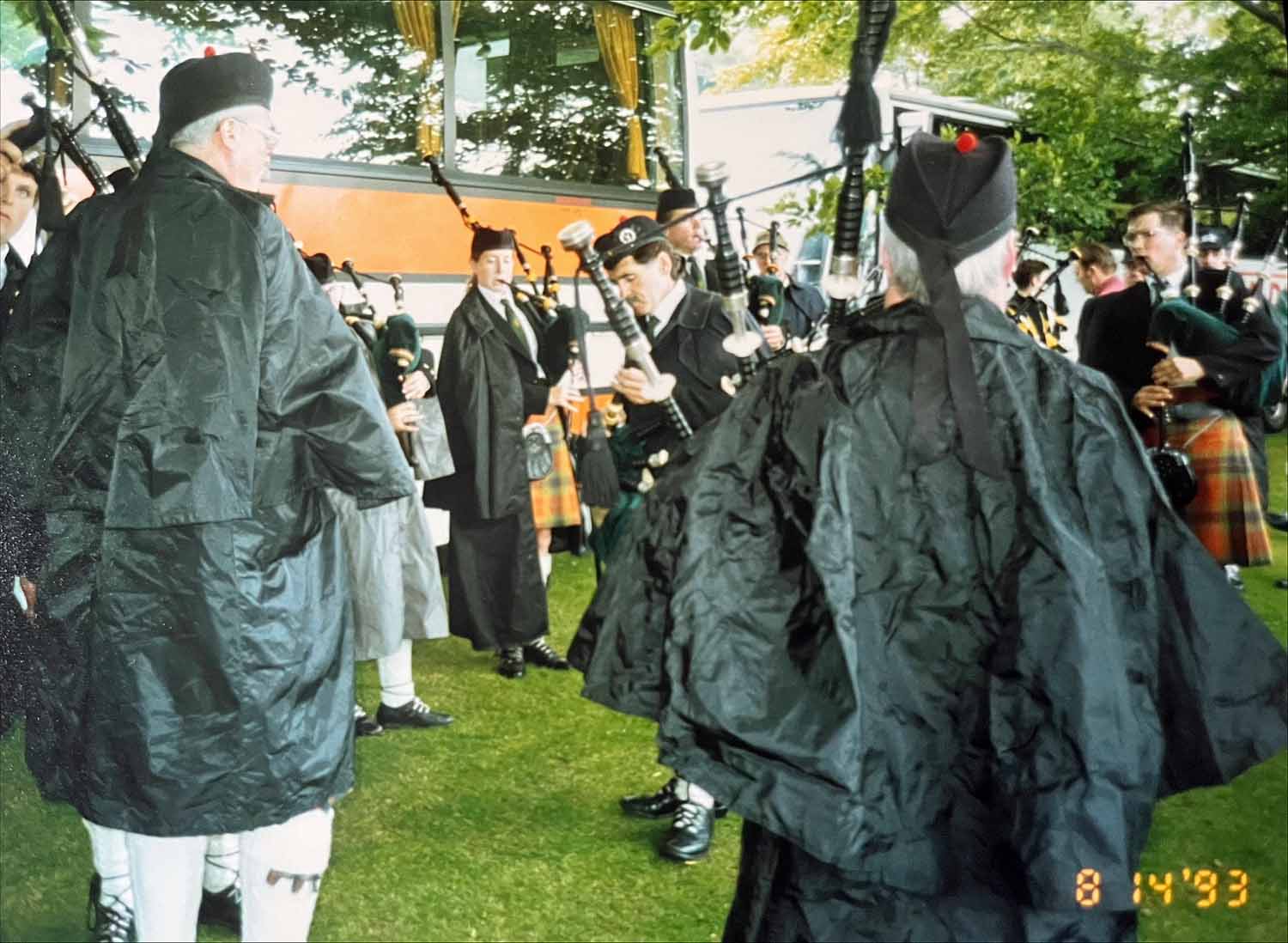
I’ll always be tremendously grateful for getting to know Bill and play in his band. Of course, I’ll be grateful for the wonderful music, the performances, and the competition successes—but mostly for the chance to just be in his company and part of his and Lily’s world.
Bill Livingstone’s voice in half a syllable—so warm and engaging—it had the vocal equivalent of a twinkle in the eye.
There are so many wonderful memories to be thankful for. I remember band practice weekends at Bill and Lil’s house, with barbecues in the backyard. I remember the two of them setting up full-on posh picnics for their lunch at the games, with proper dishes, wine, salads and strawberries. I remember the dinners they would cook for a big group in the halls of residence at Strathclyde Uni during World’s Weeks, dinners absolutely soaked in wine and so much laughter everyone would be left incapable of speech, tears rolling down our faces. I remember plentiful, always entertaining stories told with eloquence and aplomb like no one else. I remember practices preparing for concerts, with ideas flying around and excitement building. I remember meals out at O Sole Mio in Glasgow, Bill laughing and joking with the server who always called him “consigliere” (Bill wondered how the guy knew he was a lawyer, but I think he just knew Bill was the one in charge). I remember Bill holding court at the Corran Halls and Eden Court Theatre after the big solo events, always telling stories, always laughing.
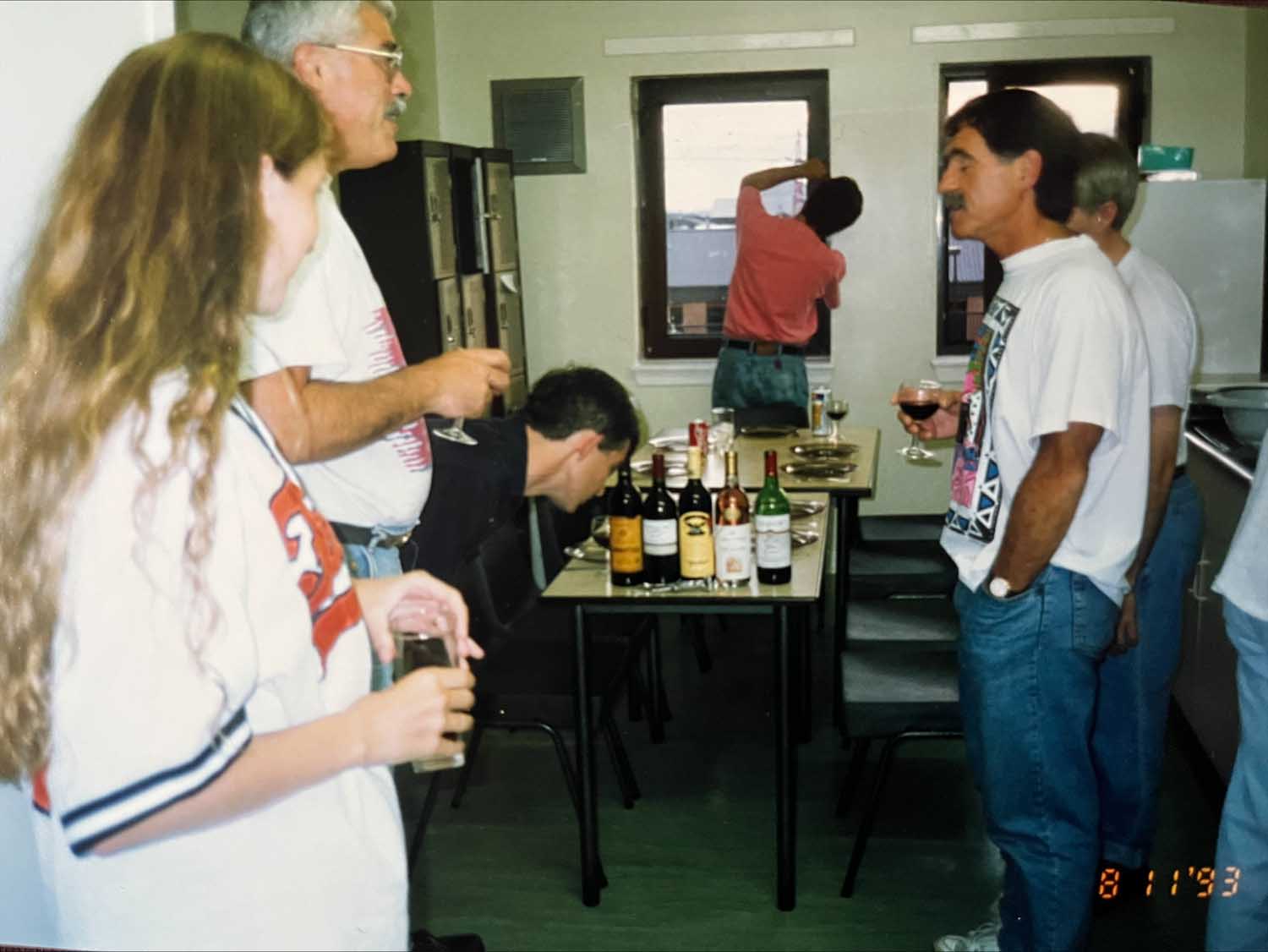
Scott Brown recently posted a video of Bill speaking to the band and wider group ahead of the “Live Back in Ireland” concert in Belfast in 2017. It was so lovely to listen to that, remember his unique way with words, and even just hear his voice. I’m sure I could recognize Bill Livingstone’s voice in half a syllable—so warm and engaging—it had the vocal equivalent of a twinkle in the eye.
So many things can be said about Bill Livingstone’s importance to piping and pipe bands, many of which have been said in recent days and will continue to be said in the days and months to come. Many who knew Bill better than I did will have wonderful stories and memories to share. For my part, I will always be so very glad to have called Bill a friend and to have spent some time in the light that shone around him.
He will be so sorely missed and so very fondly remembered, always.
A native of Toronto now living in Edinburgh, Jenny Hazzard has enjoyed a successful solo piping career in North America and Scotland. She is a member of Field Marshal Montgomery of Northern Ireland.
Kayleigh Johnstone
I learned about Bill through my mom and the Toronto Police Pipe Band. From a young age, I admired him as a mentor when he judged me at the games.
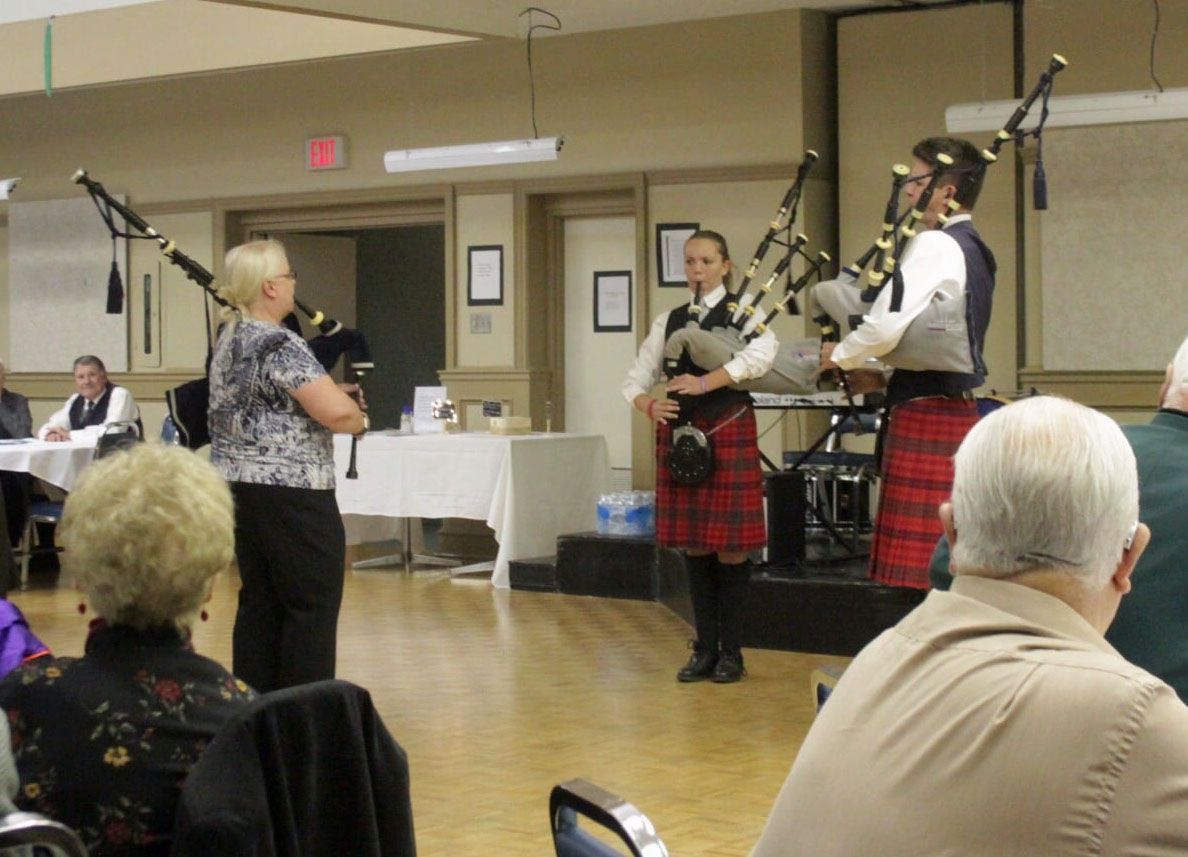
My grandfather passed away in my early stages of playing, so Bill was asked to listen to my playing. As I progressed as a player and travelled to overseas competitions, I had the honour of having Bill listen to my tunes several times a year. He was always kind and supportive of my development. He often said that he enjoyed watching and hearing the progression of my playing over time.
I was honoured to be the first recipient of the Lillian Livingstone Bursary, created by Lillian and Bill. The bursary has provided me with opportunities that not everyone has the fortune to experience.
I’m grateful for my time with Bill and will cherish the memories.
One of Ontario’s young bright lights, Kayleigh Johnstone was a pupil of Bill Livingstone for several years, taking her from amateur Grade 1 to Professional solo status. She is a criminology and social justice major at York University in Toronto.
Jack Lee
I will never forget the first time I saw and heard Bill Livingstone pipe.
I was only 12 years old and had heard of him through the Piping Times but had never seen him. Terry and I had travelled with the Seattle Boys Pipe Band to the Alma Highland Games that year.
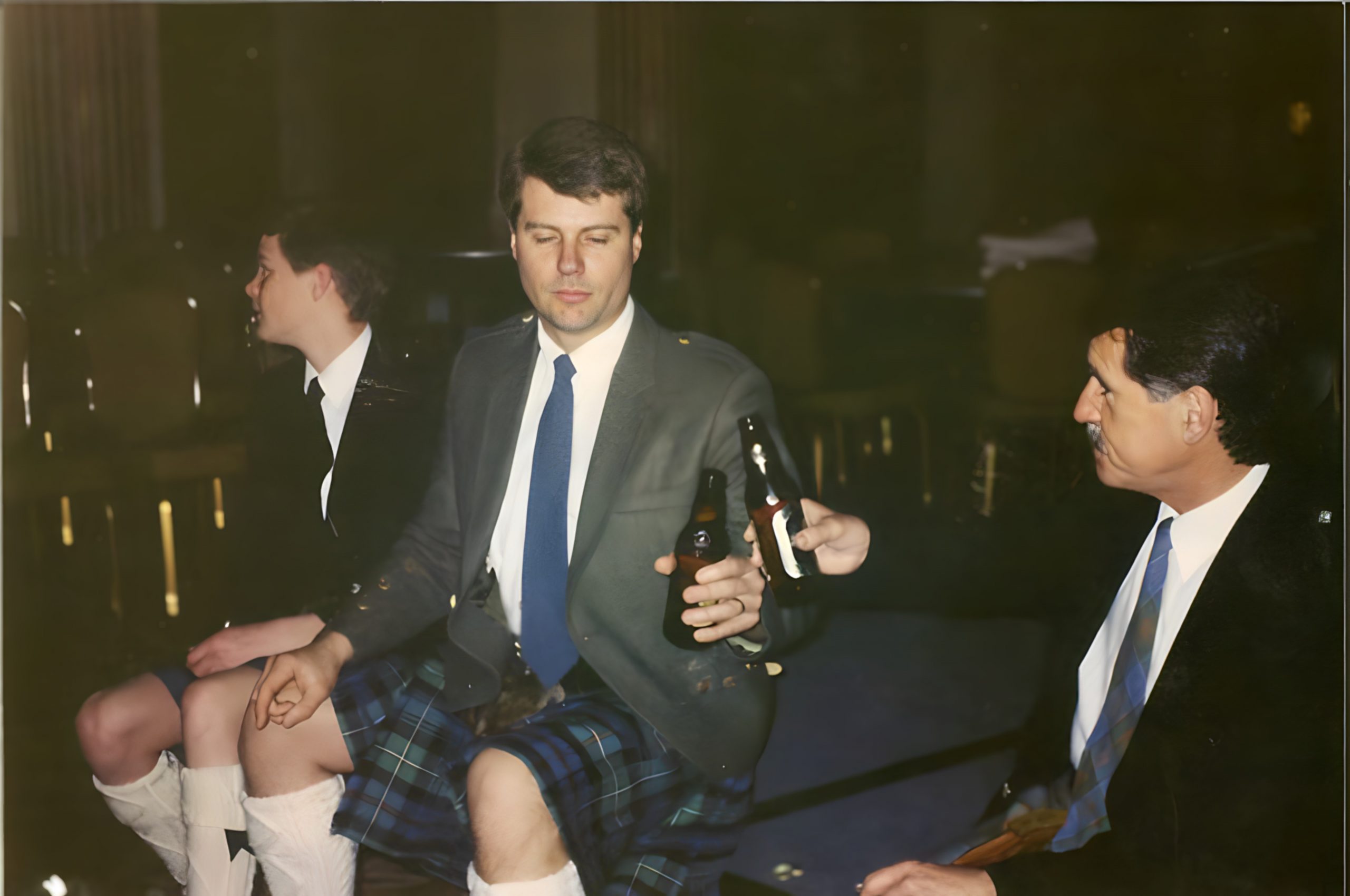
I remember hovering around the solo piping platform to hear all the great piping. When it was eventually Bill’s time to play, he did not disappoint. I had never seen a piper who commanded the stage quite like Bill. Bill always had a profound presence in his playing: virtuosity, frequent use of talcum powder, cutaway jackets, etc. He didn’t care. He just played music.
He was not afraid to make a musical decision, decide on a direction, play the music as he wanted, and let the chips fall where they might.
And how he played. Musically, he was courageous. He was not afraid to make a musical decision, decide on a direction, play the music as he wanted, and let the chips fall where they might.
![Bill Livingstone as a guest instructor at Piping Hot Summer Drummer in British Columbia. [Photo Jack Lee]](https://www.pipesdrums.com/storage/2025/02/Livingstone_Livingstone_Piping_Hot_Summer_Drummer_2005.jpg)
For 50 years, Jack Lee was Bill Livingstone’s Canadian solo piping contemporary. The pipe sergeant of Simon Fraser University, with six World Championships under his waistbelt, Lee has won everything there is in solo piping, many several times.
Doug MacRae
Over the past week, the piping world has been filled with online reflections on Bill and rightfully so. His legacy as a musician, competitor, and innovator is undeniable. His music and compositions will continue to be played, studied, and admired for generations. But for anyone lucky enough to have known him beyond his public persona, his legacy is something much greater.
I first met Bill when I joined the 78th Frasers around the age of 15, but I don’t think he “met” me until I was about 17. That was just how it worked. He had a reputation—half joke, half truth—for not bothering to learn young players’ names until they’d proven themselves. In reality, though, he was always watching. He made sure I had what I needed before I even knew I needed it. Once I was officially “in the books,” our real friendship began.
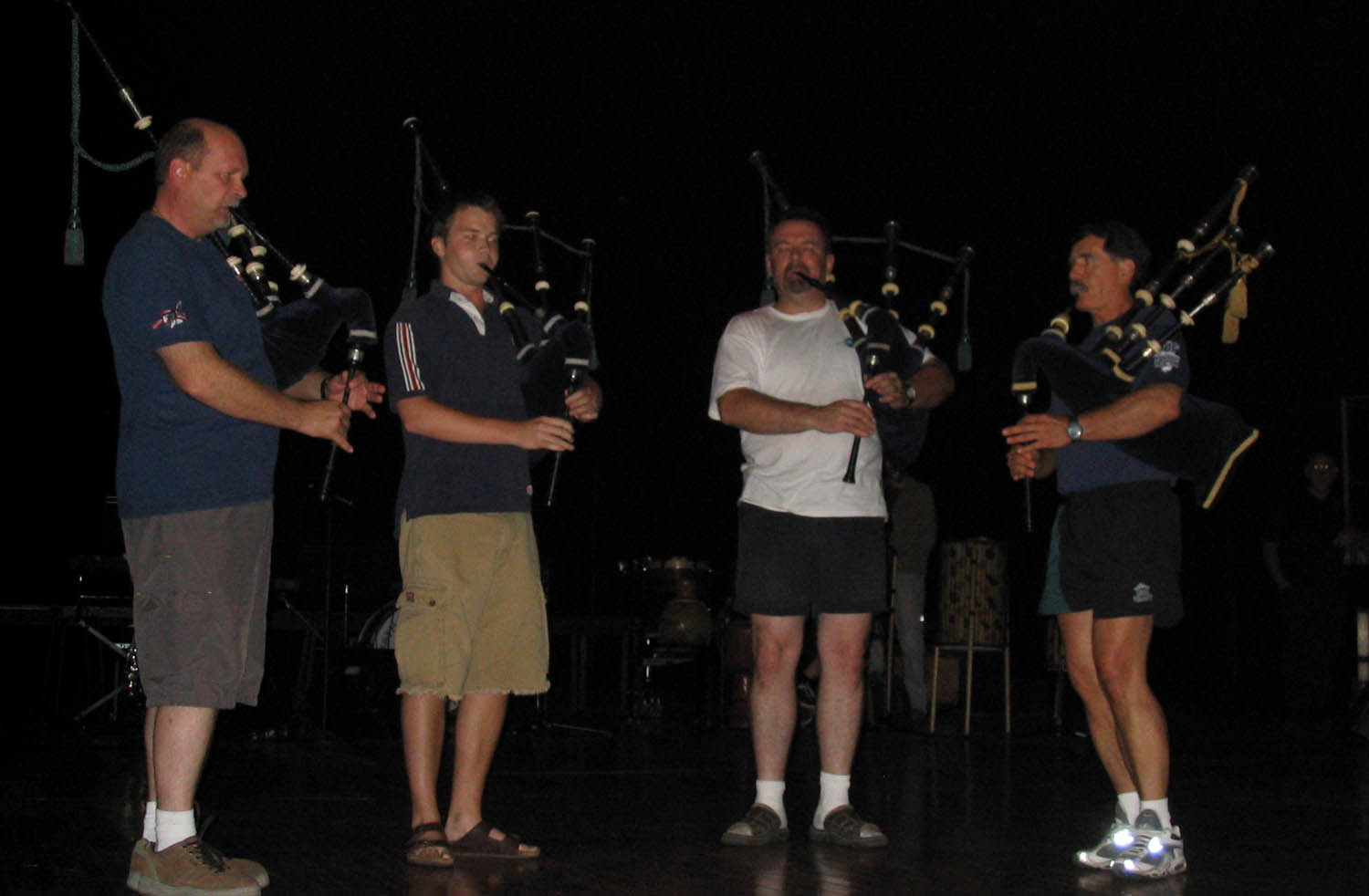
Like many, I’ve spent the past week revisiting recordings, listening to the performances that defined his career. But the memories that hit hardest aren’t from competition circles or concert halls. They’re the conversations, the ones that started before the days of call display, when I’d phone him at all hours and he’d always pick up (probably to his regret).
And the emails. Hundreds, maybe thousands, of them. I’ve been reading through them this week, and it’s striking how much of our dialogue had little to do with piping. Sometimes we talked about music. More often, it was the broader world, the absurdities of our art, and—if there was one thing about Bill—you never had to guess what was on his mind.
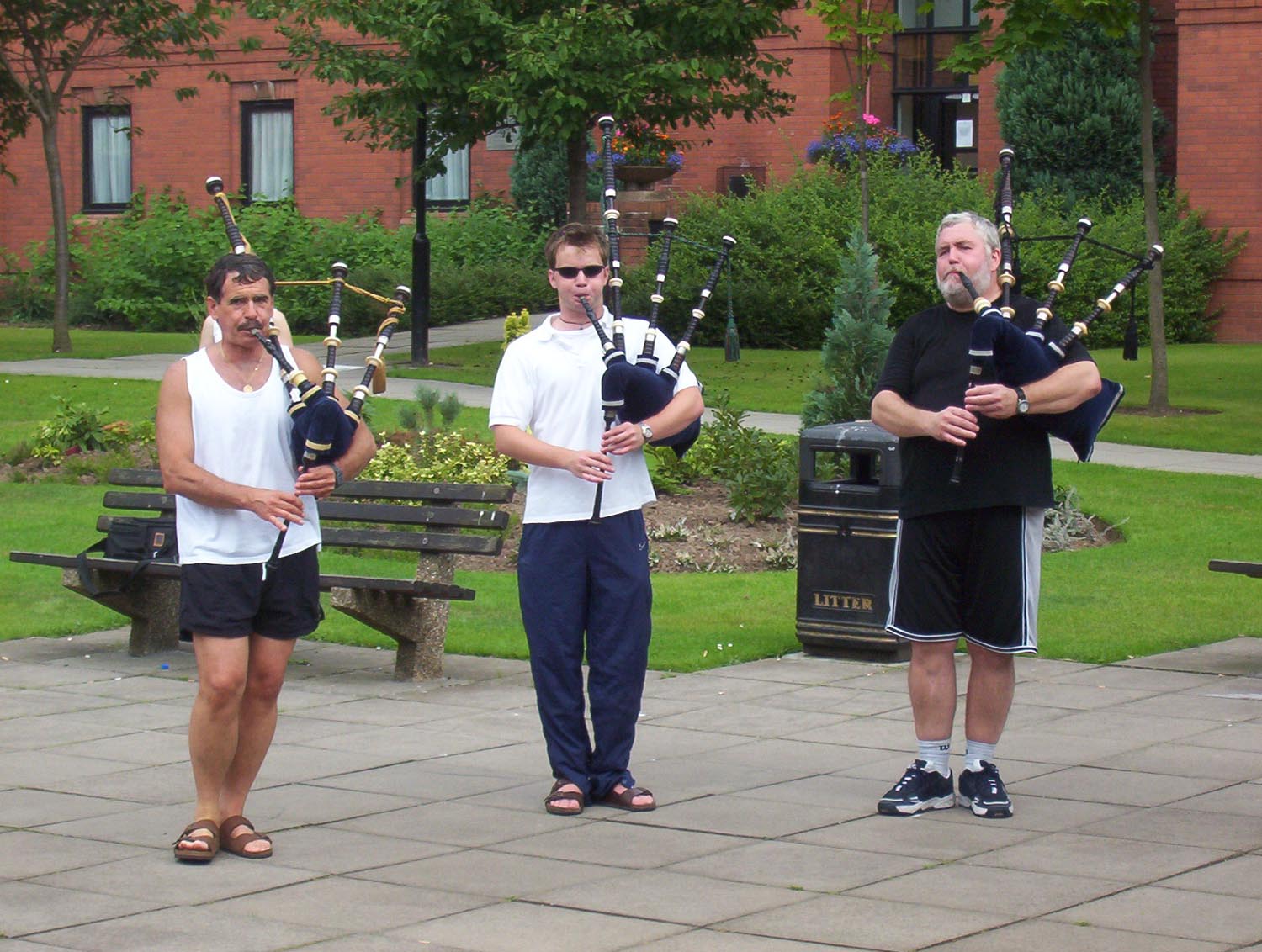
His written exchanges were just as rich—sometimes philosophical, sometimes downright ridiculous. He had a habit of bookending emails with updates on what he was drinking or eating, which was, in its own way, the most Bill thing imaginable.
“Stone-age BBQ cleaned . . . just got a vodka/tonic/soda/lemon mixed perfectly, so this will be quicker than normal . . .”
Or, after an expletive-laden critique of piping associations:
“OK . . . this is important. I now have a meat grinder. Made home-ground 100% lean burgers in Whitby . . . massive things . . . ridiculous . . . cheers, Bill.”
There was no false modesty with Bill, nor was there any unnecessary ego. He could spend an hour dissecting a piece of music, then shrug off his brilliance in a single sentence. When I once asked him what he was talking about regarding some complex time signature changes, his reply was immediate:
“I never know what I’m talking about.”
But of course, he always did.
The pipe band music we enjoy today is largely because of Bill.
Bill was razor-sharp in every way – his mind, his music, his humour. He could disarm you in a sentence, make you rethink everything you thought you knew, and leave you laughing. It was classic Bill. The man who could shake the foundation of an entire musical tradition with his ideas, then seamlessly shift gears to discuss his latest kitchen or libation experiment . . . simply unique.
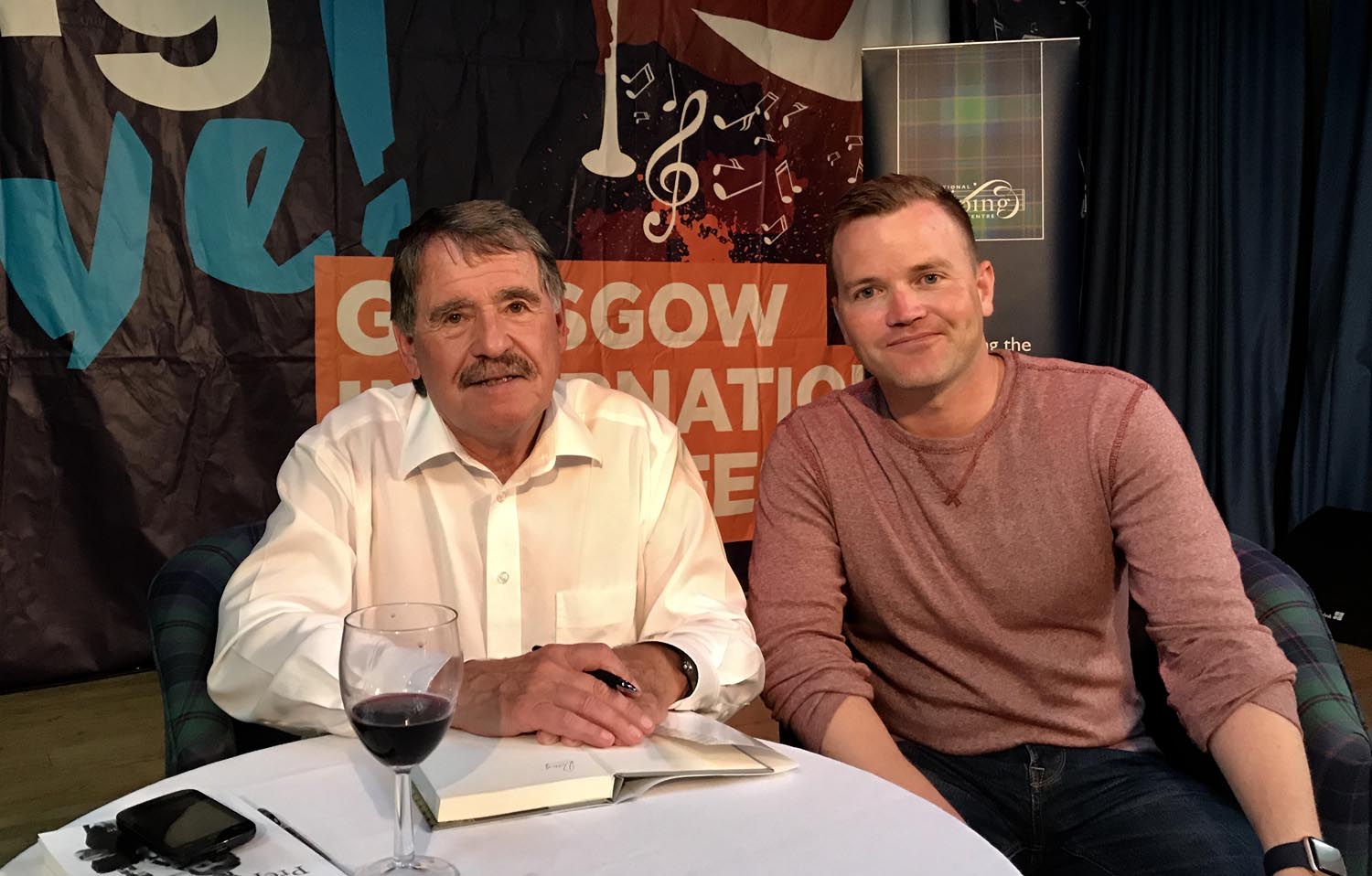
The piping and drumming world has lost one of its great minds—a true original. Bill inspired and provoked, always challenging the norms. Because of this, he introduced pipers and drummers from around the globe to innovative ways of thinking about our music, paving the way for innovation. The pipe band music we enjoy today is largely because of Bill.
Thank you, Pipe-Major, for everything you gave to me and the many musicians and friends you’ve impacted over the years.
Doug MacRae succeeded Bill Livingstone as pipe-major of the 78th Fraser Highlanders in 2010 leading the band for 13 of the 26 years he was a member.
Reid Maxwell
Where does one start?
![The 78th Fraser Highlanders, Chicago 1983. L-R: Front row Stu Liddell, Maggie, MvIvor, Tom Foote, Doug Kirkwood, Gary Passmore, Luke Allen, Tim Murphy, Sean Allen, Reid Maxwell. Middle row: Bill Livingstone, Barry Ewen, Ron Rollo, Chris Barker, Beverley Gandy, Andy Wallace, Iain Symington, Syd Girling, Iain Donaldson, John Walsh. Back row: Cameron MacDonald, Gor MacRae, Michael Grey, Ross Brown, Brian Pollock, Tom Bowen, Alex Patterson, Jake Watson. [Photo pipes|drums]](https://www.pipesdrums.com/storage/2021/11/78thFrasers_Chicago_23June1983_small.jpg)
I think of that conversation often. A simple question, a simple answer. In the spring of 1982, I was asked to join his band, which was in the transition of being renamed the 78th Fraser Highlanders.
After that first season, I was asked to become officially the lead-drummer of the 78th Fraser Highlanders, and an incredible few years followed.
I can say now that I was indeed the luckiest drummer in the world: great tunes and driving tempos seemed to suit us both very well.
At the time, I was too young and full of it to truly appreciate the magnitude of what was going on. As I reflect, I sometimes wonder how Bill ever put up with me. I can say now that I was indeed the luckiest drummer in the world: great tunes and driving tempos seemed to suit us both very well.
The summer of 1987 will always bring forth the most joyful memories: the “Live in Ireland” concert in Ballymena, Northern Ireland, and the successful completion of Bill’s five-year plan. Winning the World’s could be achieved with a lot of work.
Nearly 30 years later, after chatting with Michael Grey while judging together in Calgary/Canmore, the “Live in Ireland Project” was born.
For many a year, two things have always stood out from the original concert: Bill’s amazing solo performance of “Lord Lovat’s Lament” that started the show and his solo that started “Journey to Skye.”
On January 30, 2016, as he started the new show with “Lord Lovat’s Lament,” the surreal impact of those two pieces brought everything full circle.
There were so many great tunes played and enjoyed together.
Bill, thanks for everything.
One of the greatest pipe band drummers in history, and the long-time lead-drummer of six-time World Champions Simon Fraser University, Reid Maxwell led the 78th Fraser Highlanders’ drum section throughout the 1980s, winning the World Championship and World Pipe Band Drumming Championship in 1987. He played and plays a crucial role in establishing both bands’ distinctly driving ensemble effect.
Willie McCallum
I didn’t realize how unwell Bill had been and was very saddened to hear of his passing. My love goes out to lovely Lillian and all his friends and pupils.
Bill Livingstone was one of the first Ontario pipers I was really aware of. I read about his prizewinning solo performances in Scotland in the Piping Times as a young boy, and of course, he pretty much won it all.
When I first met him at Oban and Inverness, I was struck by his kindness to me. However, I was aware that there was a confidence about him that made me quite in awe of him. His playing was always top-class, and I could see and hear why he had been so successful.
He revelled in getting out there and putting his best tunes out there. It was just what he did, and very well indeed.
I got to know him better as I competed against him. He was always good fun in the tuning rooms. He loved the competitiveness of the piping world, and I think he revelled in getting out there and putting his best tunes out there. It was just what he did, and very well indeed. He competed to a relatively late age and inspired some of us older competitors.
When you encounter great players like Bill, you tend to study them and find out why they are so good. With Bill, it was obviously his love for the music, amazing preparation, and great natural ability. Above all, he allied this to just being a great competitor.
As a pipe-major, I loved what he did with the 78th Fraser Highlanders: great adventurous music, no fear at all, and it was remarkable that he could harness all the fantastic musical and composing talent in the band. That takes an amazing ability, and becoming World Champions in 1987. So well deserved. I think I wore out my Live In Ireland cassette in the car.
Bill Livingstone was a great player, a giant influential figure on many, and a huge presence in piping and pipe bands.
He will be missed.
Willie McCallum is one of the greatest pipers in history. He knew and competed against Bill Livingstone for more than 40 years.
Sean McKeown
“If I have seen further, it is by standing on the shoulders of giants.” – Sir Isaac Newton.
Bill was a giant. He was a rockstar. Well, as close as one could be as a piper. I remember being in awe watching him compete around the Highland Games in Ontario. He would perform his signature ritual of dipping the (birl) pinky-finger in baby powder before his solo events because the hot, humid Ontario summer days made the chanter sticky. If you were looking closely enough, you could see a small dust cloud appear after the first few birls. He was charismatic, musical and exciting to listen to. It was always a great show. His playing of piobaireachd inspired me long before I had any clue of what the big music was about.
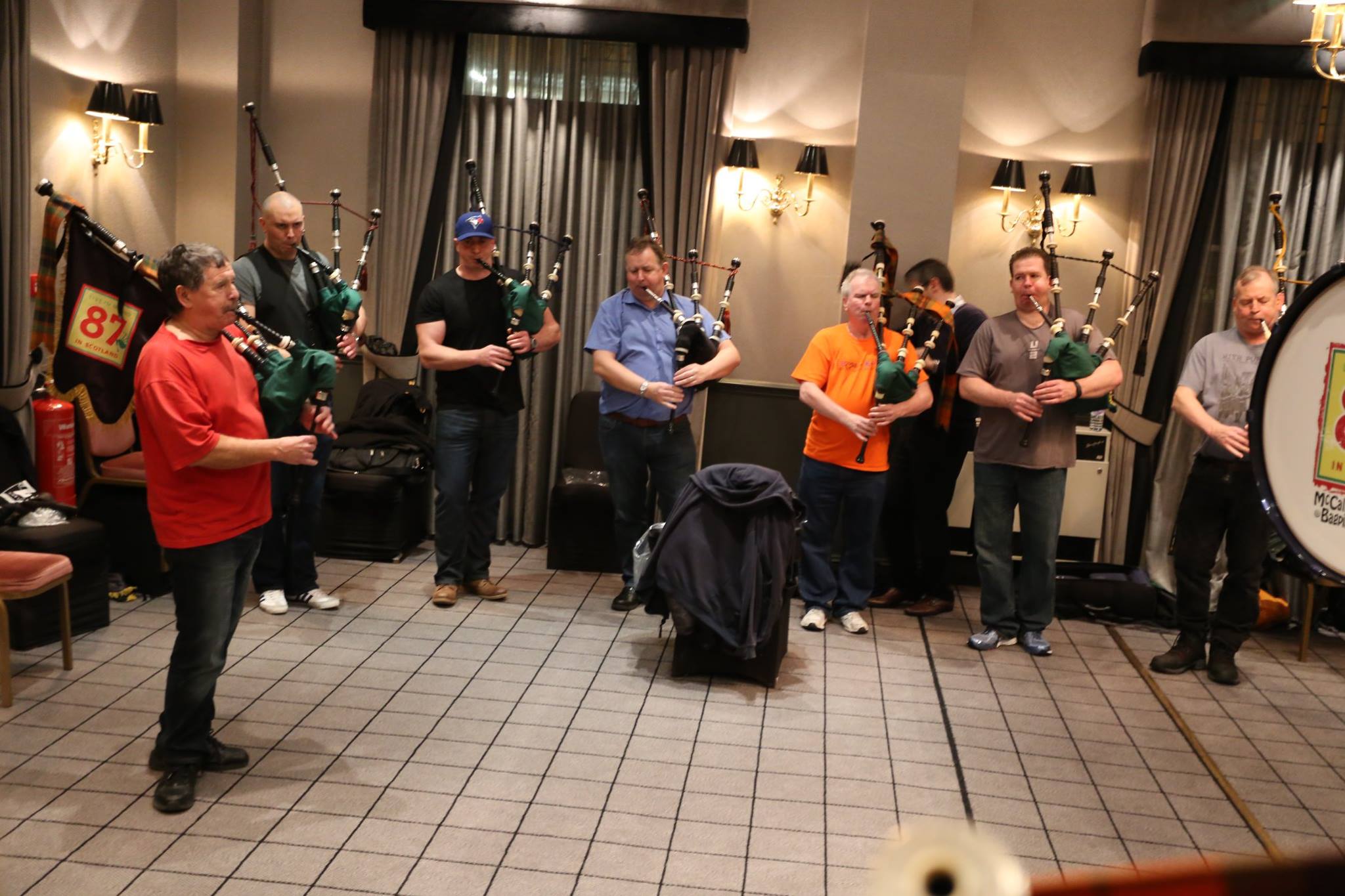
As a kid, I would watch and listen to the 78th Frasers play around the Ontario Highland Games. My parents purchased a camcorder, and filmed the grade one bands for me. I remember watching a video of their “Waulking Song” medley over and over (probably wearing out the VHS tape) – and I could likely still play it from start to finish from memory. I hadn’t heard anything like it before, but that was the magic of the 78th Frasers back then, with Bill in front and guys like Mike Grey and Bruce Gandy pumping out great tunes. They were in front. Innovative. Daring. Driving progress. Inspiring. Pipers and drummers of today stand upon the shoulders of giants. Bill with the 78th was one of those giants, and our music today is better because of him.
I was fortunate to play in that band briefly in 1998 and again from 2006 to ’10 when Bill retired as the long-standing pipe-major of the 78th Fraser Highlanders. We joined the Toronto Police Pipe Band together after that and played in the “Return to the Live in Ireland” concerts in 2016 and ’17. What an honour and experience it was to play that music from 1987 with those players.
“You need some lessons,” he told me in his direct but inviting way. I asked if that was an offer, and he said indeed it was.
In 2005, we were at the Glengarry Highland Games at Maxville. I was with the Toronto Police Pipe Band. A few beer tent pints were had after the Grade 1 competition and before scrambling to make the three-paced rolls as final massed bands started to march onto the field. We happened to be lined up next to the 78th that day. I was standing next to Bill at the front of the line as we were awaiting results. We exchanged some light-hearted words. After a few years away, I had recently returned to a solo competition, and he told me, “You need some lessons,” in his direct but inviting way. I asked if that was an offer, and he said indeed it was. This was the start of my mentorship under Bill and our growing friendship.
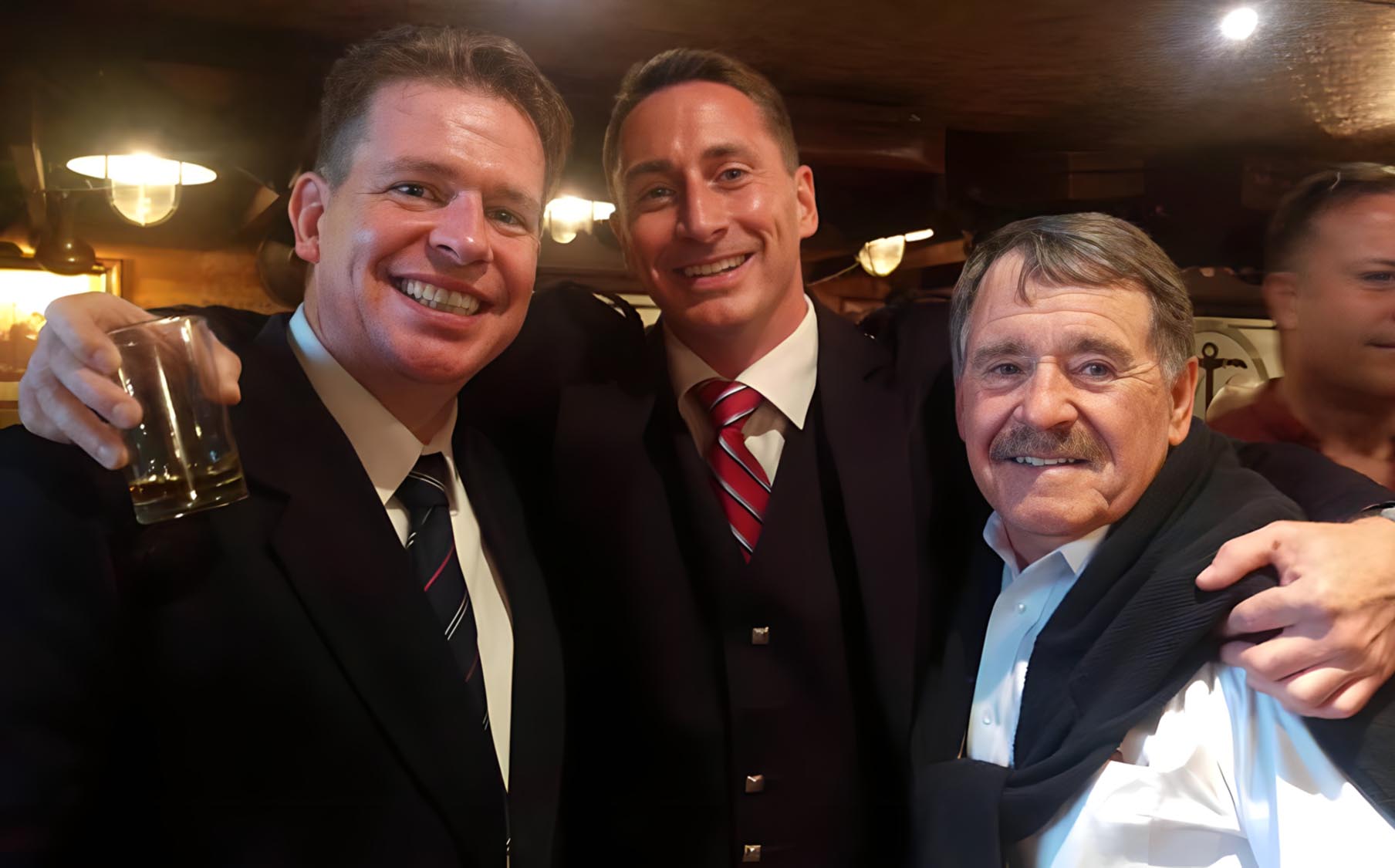
Bill helped me to understand and love the big music. I owe in large part to his teachings and inspiration for the successes I’ve had in solo competitions. Bill never took any compensation for lessons. He was very generous with his time and knowledge. It was another way he could give back to our great art. He was also one of the great storytellers. Every lesson was filled with history of the greats of piping, fun stories, and, of course, some tunes, but each session gave me so much to take away.
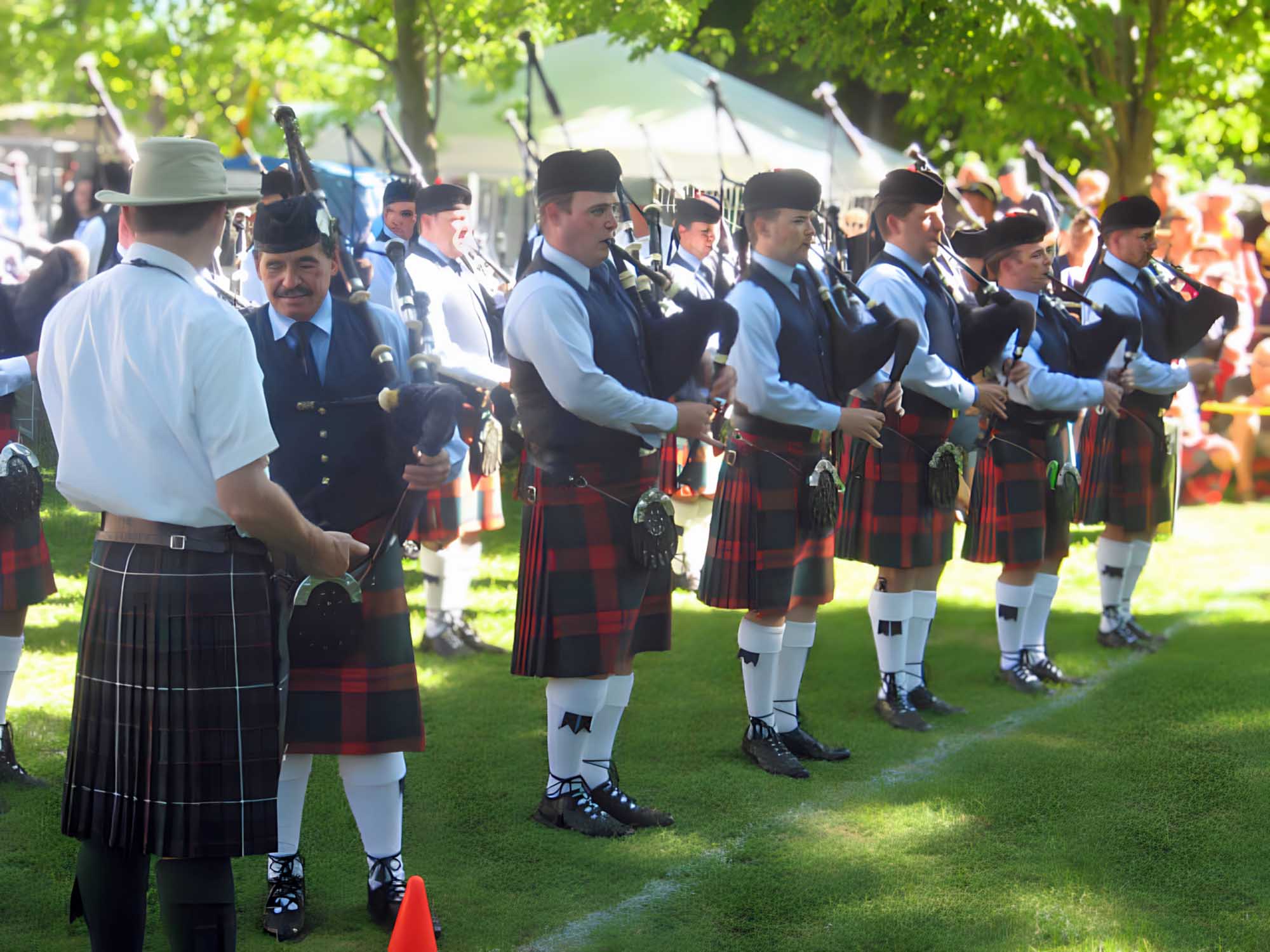
I’ve known Bill for almost 30 years and have grown close to him for nearly 20 of those. That’s a big chunk of time for me, but just a fraction of it for him when I think about his history in piping, how much he has accomplished and how many people he’s inspired along the way. We had a lot of fun together. I think most people who were fortunate enough to spend time with Bill would say the same. It was always good with Bill. He had a larger-than-life personality, which made you feel humbled and elevated in his presence.
Over the years, there have been so many great memories and stories—far too many to share here. Maybe I will share some of mine over a pint someday.

But for now, cheers to you, Bill. Teacher, mentor, friend. You were a good man and one of the (arguably the) greatest in piping. I am honoured to call you my friend. More importantly, cheers to your beautiful bride, Lilian. She was your rock, your inspiration, and the love of your life. I’m not sure you could have inspired the masses without her firmly by your side.
Piping is better for having known you, Bill. Your legacy lives on.
Sean McKeown probably received more instruction from Bill Livingstone than anyone. McKeown played in the 78th Fraser Highlanders for many years and was pipe-major of the Grade 1 Toronto Police. He now plays with Field Marshal Montgomery of Northern Ireland.
Colin MacLellan
I first met Bill Livingstone 50 years ago. It was 1975 in the laneway at the side of Oban’s Corran Halls. Bill and Lillian were travelling in Scotland, taking in the highland games and the major Scottish piping competitions. I was an impressionable 16-year-old, attending some of the senior competitions as a competitor for the first time. In those days, if you were that age, you played in what was called the under-eighteens, and if you were having reasonable success in those, it was acceptable to have a go at some of the senior events as well.
In addition to Bill, I had already met Ed Neigh, who lived in Scotland for a year, taking lessons from the late John MacFadyen. I also met Bob Worrall around the same time and became attracted to the sort of nomadic existence they were experiencing in competing in Scotland. We all became friends quickly, and the talk was piping, and more piping—Canadian piping, and those were the roots of me going a year or so later, adopting Canada as my new home, and staying for 22 years.
I settled first in Brockville, Ontario, which was a good four-hour drive from Toronto, the centre of Canadian piping at the time. Bill had been appointed the pipe-major of the City of Toronto (Cabar Feidh), and when I first heard them at the Toronto Indoor Games in 1977, I knew that I wanted to play. The stuff they incoproated at that time principally were two medleys structured around two piobaireachds: “MacIntosh’s Lament” and “The Desperate Battle of the Birds.” It was fantastic music and, indeed, to my mind, still some of the best pipe band music ever constructed. I think Bill directed a lot of it, while at the time the genius behind it was Gerry Quigg.
This was the precursor to the revival of the General Motors Pipe Band, which in a short time became the 78th Fraser Highlanders. The rest is pipe band history that almost everyone knows. I wasn’t able to be a part of that, because I had moved further east to Maxville, Ontario, which was geographically too distant for me to be a productive asset to a Grade 1 pipe band. I had my own work to do in that area.
Later on, at the end of the 1990s, I played with the 78th Frasers for three years during which time the band was unbeaten in Ontario and won prizes at the World Championships. It was fantastic to be able to listen and learn under Bill and to appreciate just what kind of pipe-major and leader he had become. He was at the peak of his powers.
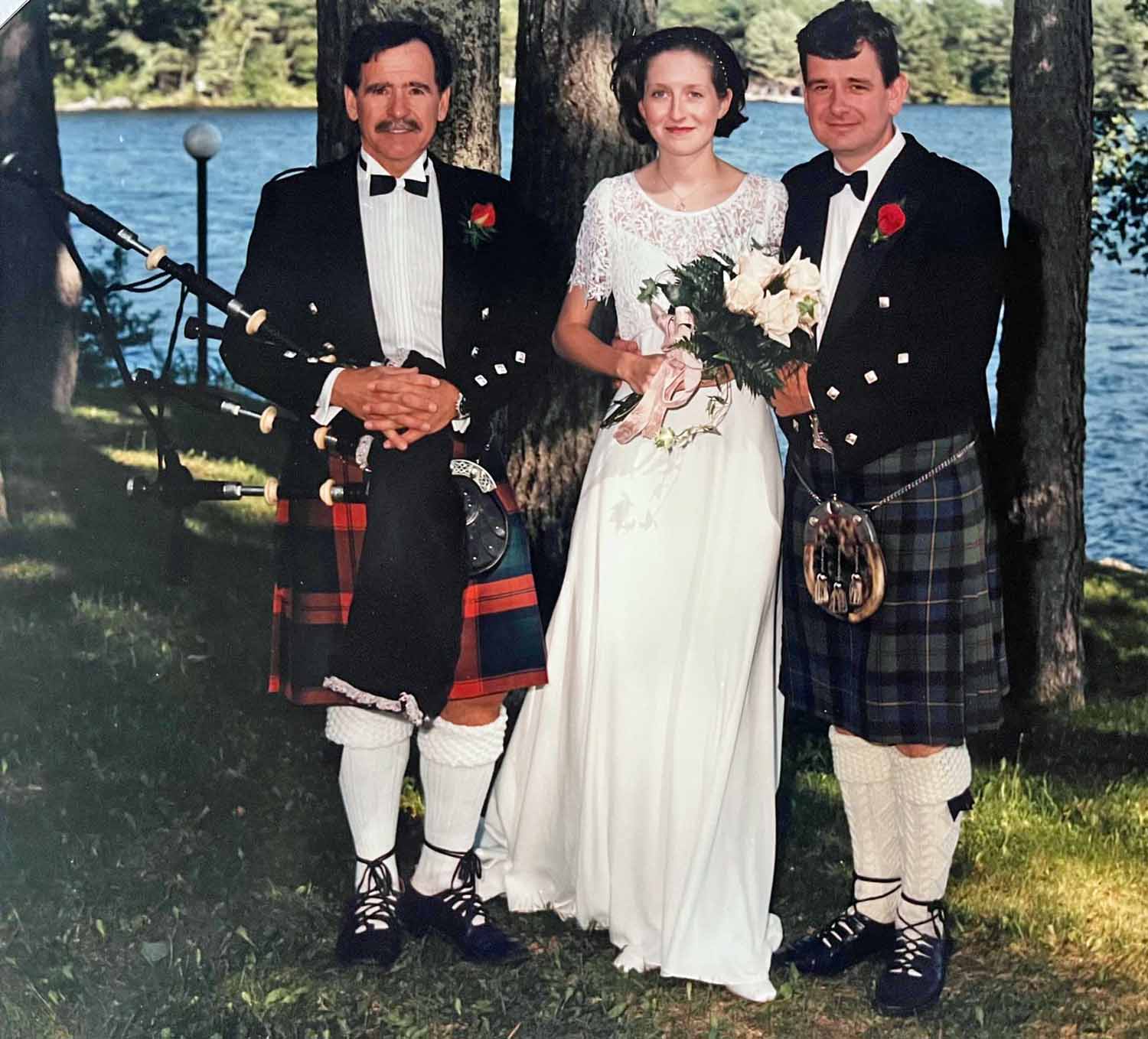
The solo scene was red hot, with pipers like Bruce Gandy, Michael Grey,Scott MacAulay, Jim McGillivray, Ed Neigh, Dr. Angus MacDonald and others playing at a very high level. It was Bill Livingstone, though, who we all wanted to get in front of rather than simply beat. It seemed to me at the time that everyone was pushing each other, but it was Bill to whom we all looked to for our motivation and our inspiration.
Occasionally, one or another of us might get in ahead of him. Still, in the piobaireachd especially, it was not unusual for Bill to win more events in an Ontario season than the rest of us put together. He was a terrific competitor and a fantastic player. He played ceol mor with a verve and a style that was bold while never overstepping the boundaries that might make the music controversial, a recipe that won Bill many, many very big awards over a long period.
He was always intensely interested in your own playing; “What did you play?” “How did you play it?” I can hear him now.
He made us all better. There is a part of us, in all of the good Ontario players, that is solely down to Bill Livingstone’s influence on us.
I’ll close with a story about Bill that always makes me smile; it makes me think about him and how he was. About 15 years ago we were having a Christmas night out, friends in Edinburgh getting together. In the afternoon, we went to a video golf simulator in Edinburgh. Present were two young up-and-comers who themselves have since made great names for themselves: Cameron Drummond and David Burnside, who is a significant reason for Boghall & Bathgate becoming the force they are now.
They were drawn as a team to play my great friend Euan Anderson and me, and to spice things up, we made a wager with them. The losing side would serve dinner at the table during the next Glenfiddich ceilidh for the entire night. There was no question which team would win; Euan and I would not have made that bet without being 100% certain. The lads gamely thought that they had a chance.
I wish I had known this would be the last parting because, if I had, I would have thanked him for all that he had done for piping, for all that he had done for us as individuals, for all of the marvellous music he had let us hear, and for having been a very good friend for all these many, many years.
The win was duly recorded, and the evening at the Glenfiddich was memorable. Bill and Lillian sat at our table alongside several others, and Cameron and David did indeed provide stellar service. Bill and Lillian were addressed as “Sire” and “Lady Livingstone.” I remember that Bill, in particular, was completely non-plussed by the whole thing. He kept asking who these young lads were and, “Why in God’s name are they doing all this?” I kept telling him they were simply piping students and, “Don’t your students in Canada do this type of thing for you?”
The punchline is that Bill was judging the Gold Medal the following year at Inverness. Cameron Drummond was trying to win it after a string of good prizes had made him a favourite. Cameron shared with me that he had hoped that his efforts during the Glenfiddich ceilidh would, at the very least, have created a favourable impression with Bill. Indeed, it seemed so. As Cameron approached the judges, Bill greeted him with a big smile. However, things went rapidly downhill when Bill loudly exclaimed for all in the audience to hear, “Ah! Burnside!”
My last meeting with Bill was at the Port Hope Highland Games last July, only a few short months ago. He was judging at a table down from me, and we had finished our duties. Bill had become a bit immobile and was waiting along with Lily for a golf cart to arrive so he could get to his car. They couldn’t find one, which allowed us a half-hour to reacquaint. It was evident that he was as enthusiastic about piping as ever.
In a way, I wish I had known this would be the last parting because, if I had, I would have thanked him for all that he had done for piping, for all that he had done for us as individuals, for all of the marvellous music he had let us hear, and for having been a very good friend for all these many, many years.
We shall all miss him dreadfully, but we are very much the better for having had the vast good fortune to witness and share his truly remarkable life.
One of the greatest pipers and contributors to piping ever, Colin MacLellan played in the 78th Fraser Highlanders from 1996 until 2000. He was pipe-major of Grade 2 Glengarry and the Grade 1 Lothian & Borders Police and a piper in the celebrated Grade 1 Spirit of Scotland bands of all-star players in 2008 and 2016. A winner of most significant solo piping awards, he lives in Edinburgh.
Jarrod Purvis
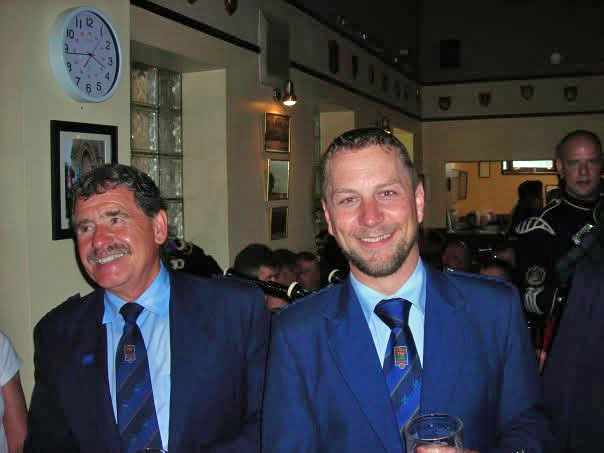
Bill changed me. As a piper, for sure. But it is deeper than that. I would be a different person today if it weren’t for the profound influence that Bill has had on all aspects of my life. When I was a young piper growing up, he was just this distant, untouchable idol—a legend, even a myth. When I went to my first 78th Frasers practice in my early twenties, there he was, smiling, kind, intimidating, hilarious. I couldn’t believe it: he was real.
Over the years, I became less star-struck. I began to be struck by something entirely different, but much more tangible and meaningful. A friendship started.
Over the years, I became less star-struck. I began to be struck by something entirely different, but much more tangible and meaningful. A friendship started. I would have never imagined how strong it would become.
There are so many memories. I can’t play you every tune, but here are a few gracenotes:
- In my first year with the band, Bill told John Cairns: “I really think that that Jeffery can play.” Jeff was my nickname for a couple of years.
- Bill’s trust in me as a piper. My piping resume was unimpressive when I joined the band. He taught me how to get into his head and play like him, even without his talent. I learned how he thought. I could see his fingers moving before they did. He would often change his style of piping mid-season, even mid-practice. I could follow his lead because he showed me how. He taught me how to be a solid band player.
- Countless conversations on the way to and from band practice. We were driving buddies for years. Our favourite days were when Ranald would drive, so we didn’t have to be responsible with our beer intake after practice.
- Boozy lunch dates. So many lunch dates.
- Whatever restaurant I was managing at the time, Bill and Lil would become instant lunch regulars.
- I wanted to buy a restaurant. I had no money. Bill and Lil were there for me. The restaurant failed. When I paid them back a couple of years later, Bill told me: “I never expected to see that money again. This tells me a lot about you.”
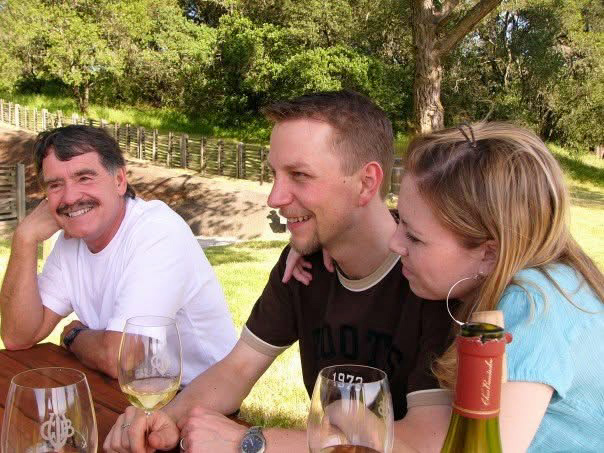
“Bill and Lily introducing us to their favourite winery, Gundlach Bundschu, in Sonoma Valley. 2007.” - Later, the many restaurants that I didn’t buy, due to his friendship, wisdom and support.
- Over many years, I have had many lunches, dinners, and wineries with Bill and Lil in San Francisco, Napa, and Sonoma.
- At the pub after practice, where he would have a seat next to him saved: “Are we going to get some wings?” Entirely rhetorical. Before we left, him frantically cleaning his moustache and fingernails, to hide the hot-sauce evidence. Lily was too smart for that, and he knew it.
- Going to Bill for support and advice during some dark times. Him sharing similar stories of his own struggles, to offer me some comfort and support.
- I was a total mess in 2021. Unemployable, isolated, marriage on the brink, health failing. Addiction and alcoholism had taken over. Life was bleak. I was a wreck, and my beautiful wife was at her limit. Who did she call? Bill. He offered his support, wisdom, love and advice. He knew of a rehab centre. I’ve been clean and sober for four years. Thanks, Bill.
- I had 30 shirts made (Bill’s large face on the front) the day before I left for Scotland. The release of Northern Man was days away. I didn’t know if it was a good idea, but I did it anyway. The look on Bill’s face when he came into the flat for practice that morning, and had 20-plus of his likeness staring back at him: 100% worth it. I wore 10 layers of that shirt to the World’s after we played. It didn’t take long for people to see and hear about the shirts. I could have made 30 more, they were in high demand.
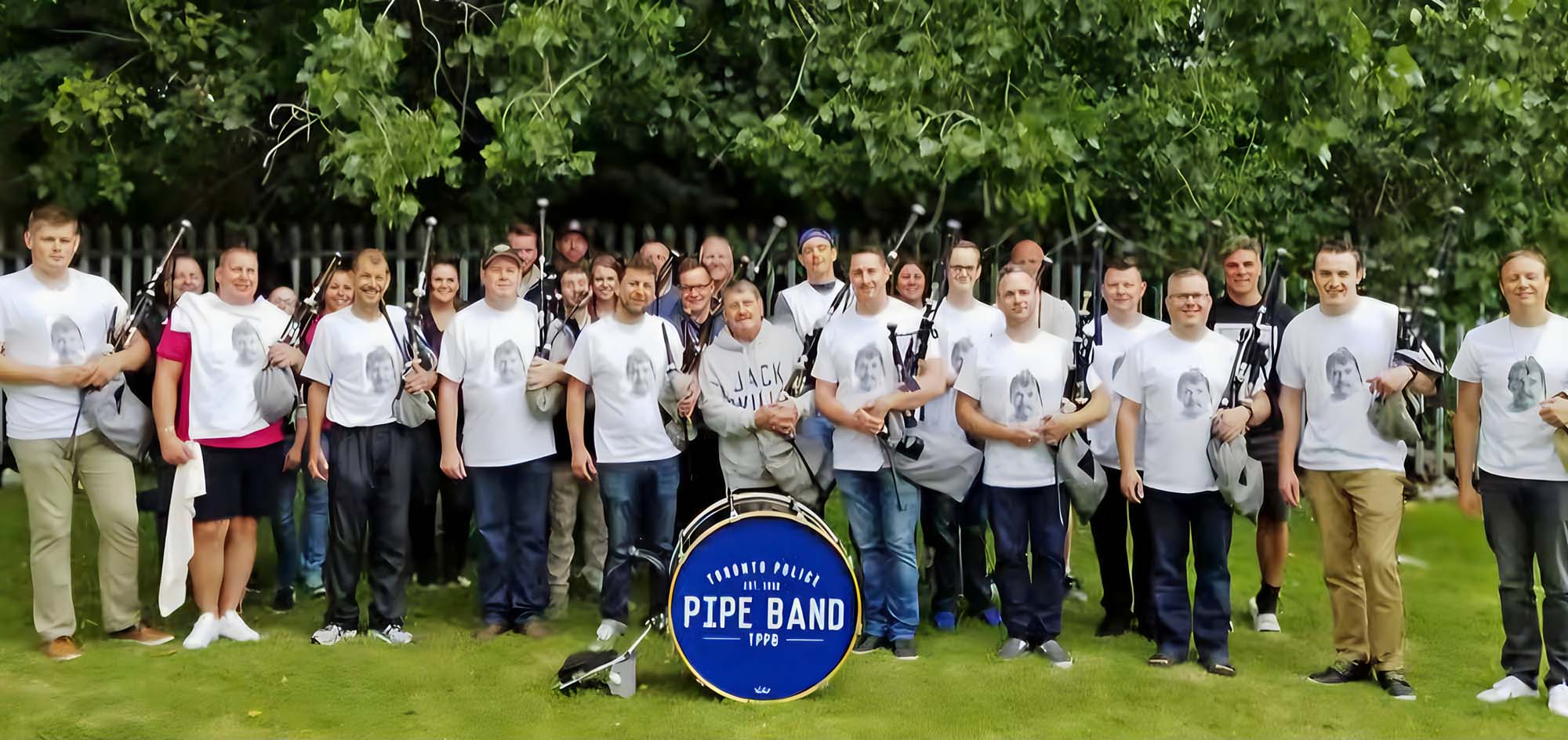
Death does not end relationships. Bill is now a part of me. I chatted with him today. I am a very lucky guy to have Bill with me forever.
Thanks Bill, for our friendship, your love, and who I am today.
Jarrod Purvis is an Ontario-based piper who played under Bill Livingstone in the 2000s and became one of his closest friends.
Thank you to all who contributed their memories and thoughts about the late Bill Livingstone. We welcome your own via the Comments section below.
A memorial celebration in Toronto is scheduled for Sunday, March 23rd.


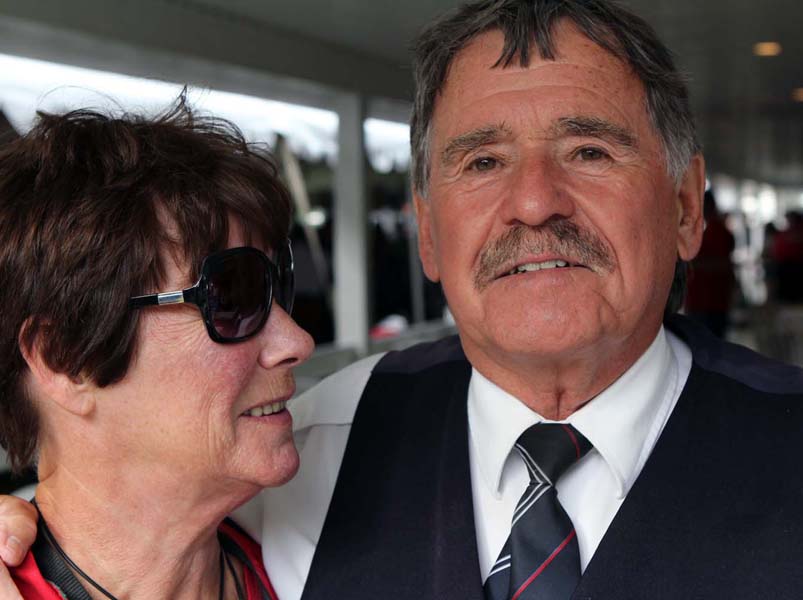
I didn’t know Bill Livingstone. I think however that I need to comment on bis passing.
A unique and fearless innovator. When his band competed at the Worlds, you always wanted to hear. I played the cd of that Irish gig until it wore out.
RIP.